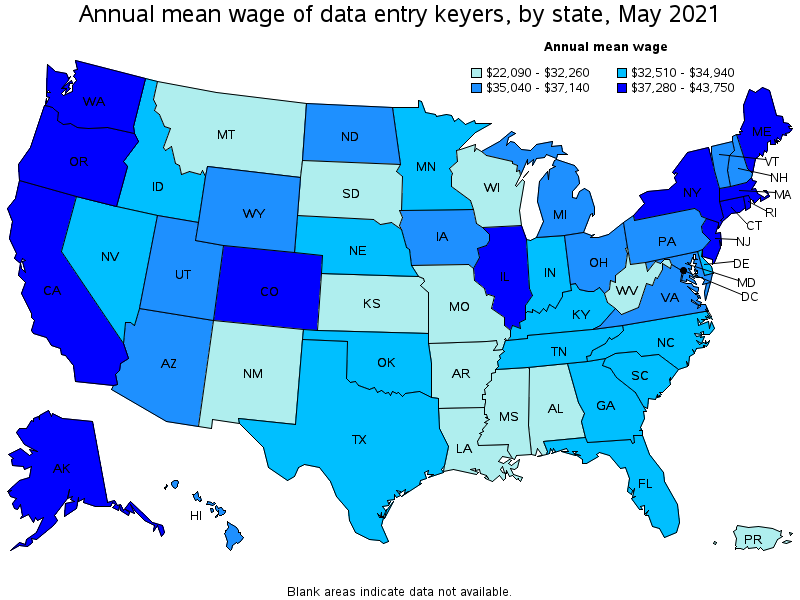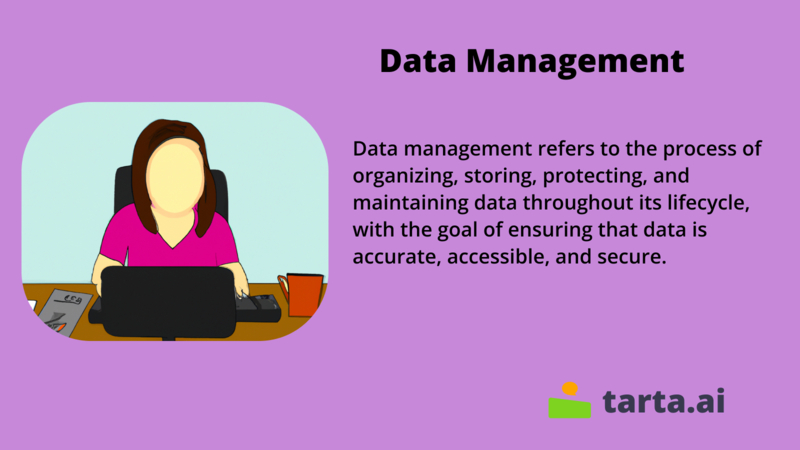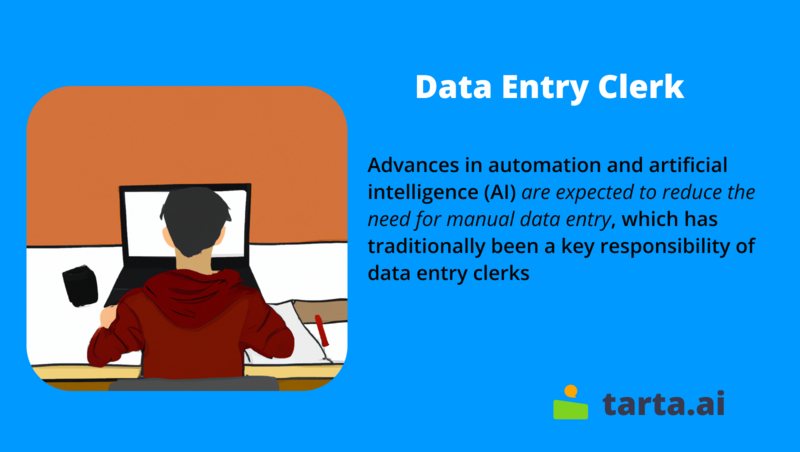Is Data Entry Clerk Position in Demand? Understanding All Aspects Of The Job

A data entry clerk is a professional who inputs, updates, and maintains accurate and relevant information into computer databases or other systems. Their primary responsibility is to ensure that data is recorded and organized correctly, as well as to verify and edit data for accuracy. A data entry clerk must possess strong typing and computer skills, attention to detail, and the ability to work under tight deadlines while maintaining a high level of accuracy.
Data entry clerks play an essential role in many different industries, from healthcare and finance to retail and hospitality. They work with a wide range of data, including customer information, financial records, inventory lists, and other types of data that need to be organized and recorded accurately.
Requirements
To become a data entry clerk, a high school diploma or equivalent is typically required, although some employers may accept candidates with less formal education if they possess the necessary skills and experience. In addition to formal education, it is important for a data entry clerk to possess basic computer skills, including familiarity with common software applications, such as Microsoft Office and Google Suite. This includes proficiency in typing, as data entry clerks must be able to enter large amounts of data quickly and accurately.
Attention to detail is also a critical skill for a data entry clerk, as they must ensure that the data they enter is correct and accurately reflects the information being recorded. This involves reviewing data carefully and cross-checking it against other sources as necessary to ensure accuracy.
Some employers may require additional training or experience with specific software programs or data entry systems. This may involve learning how to use specialized databases or other tools used to manage and organize data. Some data entry clerks may also need to be familiar with coding or other technical skills related to data management.
Good communication skills are also important for a data entry clerk, as they may need to communicate with other members of their team or with external clients to clarify information or resolve issues. Time management skills are also critical, as data entry clerks are often required to work under tight deadlines and must be able to prioritize tasks effectively.
Prior experience in data entry or a related field is not always necessary, but it can be an advantage when applying for data entry clerk positions. Candidates with prior experience may be more familiar with the tools and software used in data entry, and may be able to work more efficiently and accurately as a result. However, some employers may be willing to train candidates who possess the necessary skills and qualities but lack prior experience.
Responsibilities
In today's fast-paced and data-driven business world, accurate and organized data entry is crucial to the success of any organization. Data entry clerks play a critical role in ensuring that businesses maintain accurate and up-to-date records by inputting, managing, and verifying large amounts of data into computer databases and other systems. Here are listed their duties:
Main Responsibilities | Additional Responsibilities |
Inputting data accurately and quickly | Performing regular data backups |
Reviewing and verifying data | Maintaining confidentiality of sensitive information |
Maintaining accurate and up-to-date records | Communicating with team members and clients to clarify information or resolve issues |
Ensuring data is organized and easily accessible | Identifying and reporting errors or inconsistencies in data |
Conducting data entry quality control checks | Participating in training programs to stay up-to-date with new technology and software |
Following established procedures and guidelines | Identifying and suggesting improvements to data entry processes |
Skills
Data entry clerks must possess a unique combination of skills, including strong typing and computer skills, attention to detail, and the ability to work efficiently under tight deadlines. They also need to possess excellent communication and problem-solving abilities, as they often need to collaborate with team members and clients to resolve data discrepancies or clarify information. In this article, we will delve deeper into the main responsibilities and additional responsibilities of a data entry clerk, as well as the essential soft and hard skills needed to excel in this field.
Soft Skills | Hard Skills |
Attention to detail | Typing proficiency |
Communication skills | Computer skills |
Time management | Data entry software proficiency |
Organizational skills | Familiarity with data management tools |
Problem-solving skills | Knowledge of data entry procedures |
Ability to work independently | Understanding of database structures |
Teamwork and collaboration | Basic math and data analysis skills |
Salary
The salary of a data entry clerk can vary depending on factors such as location, level of experience, and industry. According to the U.S. Bureau of Labor Statistics, the median annual wage for data entry keyers in the United States was $34,460 as of May 2020. The lowest 10 percent of earners made less than $23,070 per year, while the highest 10 percent earned more than $51,630 per year. Some employers may offer benefits such as health insurance, retirement plans, and paid time off in addition to salary.
What does the data entry clerk's salary depend on?
- Location: Salaries can vary widely depending on the region and state in which the data entry clerk is working. For example, data entry clerks working in large metropolitan areas with a higher cost of living may earn more than those working in rural areas.

PHOTO: BLS.GOV
- Level of experience: Data entry clerks with more experience may be able to earn a higher salary due to their ability to work more efficiently and accurately, as well as their familiarity with industry-specific software and processes.
- Industry: Data entry clerks working in industries such as healthcare, finance, and government may earn higher salaries due to the importance and sensitivity of the data they are handling.
- Education and qualifications: While a high school diploma is usually the minimum requirement to become a data entry clerk, additional education or certifications in fields such as computer science, information management, or accounting may make a candidate more competitive and lead to a higher salary.
- Employer: Different employers may offer different salaries and benefits packages based on factors such as their size, budget, and company policies. Some employers may offer higher salaries and more generous benefits in order to attract and retain top talent in a competitive job market.
Fact
According to the U.S. Bureau of Labor Statistics, the highest-paying industries for data entry clerks as of May 2020 were the federal executive branch, insurance carriers, and scientific research and development services.
Pieces of advice to improve earnings
- Seek additional training or education: Pursuing additional training or education in areas such as database management, computer programming, or project management can make a data entry clerk more competitive and potentially lead to higher-paying roles within the organization.
- Specialize in a specific industry or software: By becoming an expert in a particular industry or software program, a data entry clerk may be able to command a higher salary due to their specialized knowledge and skills.
- Look for opportunities to advance within the organization: Data entry clerks who demonstrate strong performance and a willingness to take on additional responsibilities may be able to advance to roles such as data analyst, administrative assistant, or office manager, which typically come with higher salaries.
- Consider freelance or contract work: Data entry clerks who have developed a high level of skill and expertise may be able to find freelance or contract work that pays higher rates than traditional full-time employment.
- Negotiate salary and benefits: When applying for a new job or negotiating a raise, it's important for data entry clerks to do their research and advocate for themselves in order to receive the highest possible salary and benefits package. This can include researching industry standards, highlighting their skills and accomplishments, and negotiating for additional perks such as flexible scheduling or performance-based bonuses.
Fact
Some employers may offer bonuses or incentives for data entry clerks who exceed productivity targets or demonstrate exceptional accuracy and attention to detail.
Additional benefits
Additional benefits that a data entry clerk may receive can vary widely depending on the employer and industry. However, here are some common benefits that may be available:
- Health insurance: Many employers offer health insurance plans that may include medical, dental, and vision coverage.
- Retirement plans: Some employers offer retirement plans such as 401(k)s or pensions that can help data entry clerks save for their future.
- Paid time off: Data entry clerks may be eligible for paid vacation, sick leave, or personal days, depending on the employer's policies.
- Flexible scheduling: Some employers may offer flexible scheduling options such as remote work, part-time hours, or flexible start and end times.
- Training and development opportunities: Employers may provide opportunities for data entry clerks to attend conferences, workshops, or training programs to improve their skills and advance their careers.
- Performance-based bonuses: Data entry clerks who meet or exceed performance targets may be eligible for bonuses or other incentives.
It's important to note that not all employers offer the same benefits, and some benefits may be contingent on factors such as employment status (full-time vs. part-time), seniority, or job performance.
Job environment
The job environment for a data entry clerk can vary depending on the employer and industry, but here is a general overview:
Settings:
- Office: Many data entry clerks work in an office setting, typically in an administrative or data management department.
- Remote: With the rise of remote work, some data entry clerks may work from home or another location outside of the office.
Tools:
- Computer: Data entry clerks use computers to input, manage, and manipulate data. They may use desktop or laptop computers, and may work on either Windows or Mac operating systems.
- Software: Data entry clerks often use specialized software programs designed for data entry, such as Microsoft Excel or Access, or industry-specific software.
- Scanners and other hardware: Depending on the type of data being entered, data entry clerks may use scanners or other hardware to capture and input information.
- Ergonomic tools: Since data entry clerks spend much of their time typing and working on a computer, they may use ergonomic tools such as keyboards, mice, or chairs to minimize strain and prevent injury.
Overall, the job environment for a data entry clerk is typically indoors, with a focus on computer-based work and a need for attention to detail and accuracy. The tools and software used may vary depending on the employer and industry, but proficiency in basic computer skills and typing is a must.
Work schedule
Data entry clerks typically work full-time hours, which can vary depending on the employer and industry. Some employers may also offer part-time or flexible work arrangements.
In general, data entry clerks may work regular business hours, which are typically Monday through Friday during normal business hours (9:00 am to 5:00 pm or similar). However, some employers may require evening or weekend work, particularly during busy periods or to meet project deadlines.
Overtime may also be required, particularly during periods of high workload or when there are deadlines to meet. Data entry clerks may need to work additional hours or adjust their schedules to ensure that work is completed accurately and on time.
With the rise of remote work, some data entry clerks may have more flexibility in their work schedules, particularly if they are working from home or another location outside of the office. However, even in these cases, there may still be requirements for regular work hours and timely completion of work.
Education
The education required to become a data entry clerk typically includes a high school diploma or equivalent. In some cases, employers may require additional education or training in a related field.
High school diploma or equivalent:
Most employers require a high school diploma or equivalent for data entry clerk positions. This education provides a foundation in basic reading, writing, and math skills, as well as basic computer skills and typing proficiency.
Associate's degree:
While not always required, an associate's degree in a related field such as computer science or data management may be preferred by some employers. This type of education can provide more in-depth knowledge of data management software, database design, and other technical skills.

Certifications:
Data entry clerks may also benefit from obtaining certifications in specific software programs or data management tools. For example, some employers may prefer candidates who have obtained certification in Microsoft Excel, which is a commonly used software program for data entry and analysis.
Overall, the education requirements for a data entry clerk are relatively minimal, with most employers requiring a high school diploma or equivalent. However, additional education or certifications can be beneficial for those looking to advance in the field or work in a specialized area of data management.
Career Paths
Ways of career development
- Specialization: A data entry clerk working in the medical industry can specialize in medical coding or medical billing. Similarly, a data entry clerk working in the legal industry can specialize in legal transcription or paralegal work.
- Education or Training: A data entry clerk can pursue an associate's or bachelor's degree in fields related to data management, such as computer science or information technology. Alternatively, they can enroll in training programs focused on specific software tools or data management techniques.
- Certifications: A data entry clerk can pursue certifications in specific software tools, such as Microsoft Excel or Access. They can also pursue certifications in data management or related fields, such as the Certified Data Management Professional (CDMP) certification.
- Advancement Opportunities: A data entry clerk can seek advancement opportunities within their organization by applying for supervisory or management roles. Alternatively, they can look for opportunities to take on more responsibility within their current role, such as training new data entry clerks or leading data entry projects.
- Related Careers: A data entry clerk can transition into related careers in data management, such as data analyst or data scientist. To do so, they may need to obtain additional education or training, such as a bachelor's or master's degree in data science or statistics. They may also need to develop skills in data analysis, visualization, and programming.

PHOTO: GETTY IMAGES
Alternative Careers and Similar Jobs
While data entry clerks are an essential part of many organizations, there are several alternative and similar careers that may appeal to those with similar skills and interests. From administrative assistants to virtual assistants and data analysts to medical coders, these careers require a range of skills and expertise, from strong organizational skills and attention to detail to advanced knowledge of data management tools and coding systems.
Job Title | Job Description |
Administrative Assistant | Performs various clerical duties such as data entry, answering phones, scheduling appointments, and maintaining records. |
Receptionist | Greets visitors, answers phones, and directs calls to the appropriate department. May also perform data entry and other clerical duties. |
Bookkeeper | Maintains financial records, reconciles accounts, and processes invoices and payments. May also perform data entry and other clerical duties related to financial transactions. |
Customer Service Representative | Interacts with customers to answer questions, resolve issues, and provide support. May also perform data entry and other clerical duties related to customer accounts. |
Data Analyst | Analyzes and interprets data to help organizations make informed decisions. Requires strong analytical and problem-solving skills, as well as knowledge of data management tools and techniques. |
Content Writer | Creates written content for websites, blogs, and other digital platforms. May also perform research and data entry to support content creation. |
Transcriptionist | Transcribes audio recordings into written documents. Requires excellent typing skills and attention to detail. |
Data Scientist | Analyzes and interprets complex data sets to identify patterns and trends. Requires advanced knowledge of statistics and data analysis tools. |
Virtual Assistant | Provides administrative support to clients remotely, performing tasks such as data entry, email management, and scheduling appointments. |
Medical Coder | Assigns codes to medical diagnoses and procedures for billing purposes. Requires knowledge of medical terminology and coding systems. |
Job Market
The job market for data entry clerks is somewhat stable, with demand fluctuating depending on the industry and geographic location. While advances in automation and artificial intelligence have led to some automation of data entry tasks, there is still a need for human data entry clerks in many industries.
According to the U.S. Bureau of Labor Statistics, the employment of data entry keyers is projected to decline by 7 percent from 2020 to 2030. However, there will still be job opportunities for data entry clerks, particularly in industries such as healthcare, finance, and government, where there is a high volume of data that needs to be accurately entered and maintained.
In addition, data entry clerks who have additional skills, such as knowledge of specialized software or experience with data analysis, may have an advantage in the job market and be able to pursue more specialized roles in data management or analysis. Overall, while the job market for data entry clerks may not be rapidly expanding, there are still opportunities for individuals with strong data entry skills and attention to detail.
Possibilities of part-time and remote job
The possibilities of part-time and remote jobs for data entry clerks have increased significantly in recent years due to the growth of virtual work environments and advancements in technology. Many companies now offer remote work arrangements for data entry clerks, allowing them to work from home or any location with internet access. Part-time data entry jobs are also available in some industries, such as healthcare and finance, where there is a need for temporary or project-based support.
Freelance work is also an option for data entry clerks, as there are several online platforms that offer data entry and other administrative tasks to remote workers. These platforms allow data entry clerks to find work opportunities and work on their own schedules.
However, it's important to note that not all employers offer part-time or remote work arrangements for data entry clerks. Some companies may require full-time on-site work, especially in industries that deal with sensitive information, such as government or legal. The possibilities of part-time and remote jobs for data entry clerks may depend on various factors, including the employer's policies, industry norms, and the clerk's individual skills and qualifications.

Job satisfaction
Data entry clerks play an important role in organizations of all sizes, helping to ensure that critical information is accurately recorded and stored in databases and other systems. While the job can be repetitive and require a high degree of focus, it also offers the opportunity to gain valuable experience in a variety of industries and to develop skills that are in high demand in today's data-driven economy. In this message, we'll explore the advantages and disadvantages of the data entry clerk's job, to help you decide if this career path is right for you.
Advantages of a data entry clerk's job include:
- Low barrier to entry: A high school diploma or equivalent, basic computer skills, and typing proficiency are typically the only requirements to become a data entry clerk.
- Flexible work arrangements: Many data entry clerk positions offer part-time or remote work arrangements, allowing for a more flexible schedule.
- Opportunities for career advancement: Data entry clerks can gain experience and knowledge in various industries, which can lead to advancement opportunities within the company or industry.
- Predictable job duties: Data entry clerk duties are typically consistent and straightforward, allowing for a predictable work routine.
Disadvantages of a data entry clerk's job include:
- Repetitive nature of the work: Data entry duties can be monotonous and repetitive, leading to potential boredom and lack of engagement.
- Risk of errors: Data entry clerks may face pressure to work quickly, which can increase the likelihood of errors in data input.
- Limited job growth opportunities: While there are opportunities for career advancement, data entry clerk positions may have limited potential for growth beyond entry-level positions.
- Potential for job automation: Advancements in technology may lead to the automation of certain data entry duties, potentially leading to job loss for some data entry clerks.

PHOTO: GETTY IMAGES
Government Programs
There are several government programs available in the United States that can provide support and resources for individuals interested in pursuing a career as a data entry clerk. Here are a few examples:
- The Workforce Innovation and Opportunity Act (WIOA): This federal program provides funding for job training and education programs, including those focused on developing skills for in-demand industries like data entry.
- The Supplemental Nutrition Assistance Program (SNAP) Employment and Training Program: This program provides job training and other employment services to individuals who are receiving SNAP benefits (formerly known as food stamps).
- The Trade Adjustment Assistance (TAA) Program: This program provides job training and other support to workers who have lost their jobs as a result of foreign trade.
- The Department of Labor's Employment and Training Administration (ETA): The ETA offers a range of programs and resources for job seekers, including those interested in pursuing careers in data entry or related fields.
It's worth noting that eligibility and availability of these programs can vary depending on factors such as location and individual circumstances. It's a good idea to research the specific programs and resources available in your area to determine if you qualify and how to apply.
- The demand for data entry clerks is declining due to automation and technological advancements.
- The job requires basic computer and typing skills, making it a good entry-level position for those with limited experience.
- Data entry clerks are employed across many industries, including healthcare, finance, and government.
- The job typically offers low to moderate pay and limited opportunities for career advancement.
- Those with strong attention to detail, organizational skills, and the ability to work quickly and accurately may have an advantage in this role.
- To remain competitive in the job market, data entry clerks may need to develop additional skills such as familiarity with data management tools and techniques.
- There may be opportunities for data entry clerks to advance to other administrative or support roles within their organizations.
FAQ
What is the job outlook for data entry clerks?
The job outlook for data entry clerks is generally stable, with little to no projected job growth or decline over the next several years.
What industries employ the most data entry clerks?
Data entry clerks are employed in a wide range of industries, including healthcare, finance, government, and manufacturing.
Are data entry clerk jobs typically full-time or part-time?
Data entry clerk jobs can be either full-time or part-time, depending on the employer and the specific job requirements.
Are there opportunities for career advancement as a data entry clerk?
While there may be limited opportunities for career advancement as a data entry clerk, some may be able to move into related roles such as administrative assistant, data analyst, or bookkeeper.
What education or training is required to become a data entry clerk?
high school diploma or equivalent is typically required to become a data entry clerk, and some employers may prefer candidates with some college coursework or previous clerical experience.
What skills are important for a data entry clerk to have?
Important skills for a data entry clerk include strong typing and computer skills, attention to detail, the ability to work under tight deadlines, and the ability to maintain a high level of accuracy.
What is the average salary for a data entry clerk?
The average salary for a data entry clerk varies depending on the location, industry, and employer, but according to the U.S. Bureau of Labor Statistics, the median annual wage for data entry keyers was $34,740 as of May 2020.